Farewell, My Lovely
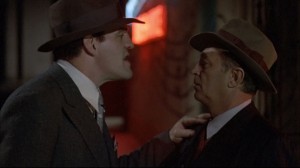 When you rely on the 20 year old cycle of nostalgia as your form of entertainment, you know that the material is going to date instantly. It’s one thing to be a sort of time capsule movie that reflects the period it was made in (like William Friedkin’s To Live and Die in LA), but try to watch a movie like The Wedding Singer now, where the simple existence of Billy Idol is no longer automatically funny (if it ever was), and your nose my flare up, only able to smell the desperation in the air.
When you rely on the 20 year old cycle of nostalgia as your form of entertainment, you know that the material is going to date instantly. It’s one thing to be a sort of time capsule movie that reflects the period it was made in (like William Friedkin’s To Live and Die in LA), but try to watch a movie like The Wedding Singer now, where the simple existence of Billy Idol is no longer automatically funny (if it ever was), and your nose my flare up, only able to smell the desperation in the air.
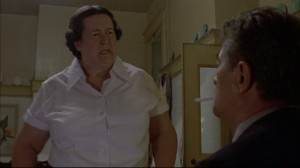 Last night (at least it was last night when this was originally written), I saw Friends With Benefits, a standard romantic comedy in R rated clothing, and there are more than a few scenes whose entire point is to remind you that there was music in the 1990s that was catchy then, but kitschy now. No different than any movie from the mid 1990s that had characters talking to a video camera, or from the late 1990s to the early 2000s that featured characters bonding over karaoke or singing along to a song on the radio. But when movies eclipse the 20 year cycle (most float between 15-18 years after the fact), it can no longer be seen as “cute” or any form of nostalgia, just being late to the party. That’s what happened to the Topher Grace vehicle from earlier this year, Take Me Home Tonight, which sat on the shelf so long (four years) that its 1980s setting, something that added nothing to the story, took on an almost pitiable burden that it never recovered from.
Last night (at least it was last night when this was originally written), I saw Friends With Benefits, a standard romantic comedy in R rated clothing, and there are more than a few scenes whose entire point is to remind you that there was music in the 1990s that was catchy then, but kitschy now. No different than any movie from the mid 1990s that had characters talking to a video camera, or from the late 1990s to the early 2000s that featured characters bonding over karaoke or singing along to a song on the radio. But when movies eclipse the 20 year cycle (most float between 15-18 years after the fact), it can no longer be seen as “cute” or any form of nostalgia, just being late to the party. That’s what happened to the Topher Grace vehicle from earlier this year, Take Me Home Tonight, which sat on the shelf so long (four years) that its 1980s setting, something that added nothing to the story, took on an almost pitiable burden that it never recovered from.
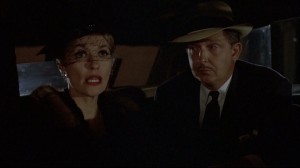 Of course Take Me Home Tonight had other major problems, such as the fact that it wasn’t particularly funny, and nothing that happens in it is presented in an original or interesting fashion. I’m sure that these problems weighed on director Dick Richards while he was making Farewell, My Lovely, a 1975 adaptation of Raymond Chandler’s novel. The first adaptations of the novel were in 1942 and 1944 (as The Falcon Takes Over and Murder, My Sweet) and the film noir style was so entrenched in that [pre-MPAA] era, that to take stuff like private detectives narrating the story, femme fatales, flashing neon signs, and other tropes seriously would be pretty difficult.
Of course Take Me Home Tonight had other major problems, such as the fact that it wasn’t particularly funny, and nothing that happens in it is presented in an original or interesting fashion. I’m sure that these problems weighed on director Dick Richards while he was making Farewell, My Lovely, a 1975 adaptation of Raymond Chandler’s novel. The first adaptations of the novel were in 1942 and 1944 (as The Falcon Takes Over and Murder, My Sweet) and the film noir style was so entrenched in that [pre-MPAA] era, that to take stuff like private detectives narrating the story, femme fatales, flashing neon signs, and other tropes seriously would be pretty difficult.
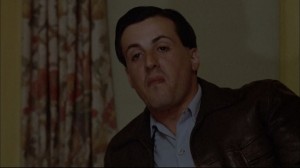 Richards’ decision to play Farewell, My Lovely straight was a bold one, as even Robert Altman had mocked the proceedings in his Chandler adaptation, 1973’s The Long Goodbye, presenting his hero, Philip Marlowe, as a man completely out of touch with his surroundings. Adding complications was 1974’s Chinatown, which was a period noir far more complex that Chandler’s array of goons and gumshoes. Farewell, My Lovely doesn’t linger in the mind like Chinatown does, but it shares a cinematographer, John A. Alonzo, whose lighting is so convincing that we never want for the black and white photography that most people associate film noir with. Farewell, My Lovely looks more like an Edward Hopper painting than any Edward Hopper painting does. Hammering the point home is Dean Tavoularis’ production design, using Alonzo’s burned brown color scheme perfectly, never reminding us of noir’s inherent artifice. Tavoularis did the same thing for Gordon Willis’ deep browns in The Godfather, which like Farewell, My Lovely has a source novel full of pulp and circumstance, that has been reworked into class instead of the easier route, which would be to turn it into B-movie trash.
Richards’ decision to play Farewell, My Lovely straight was a bold one, as even Robert Altman had mocked the proceedings in his Chandler adaptation, 1973’s The Long Goodbye, presenting his hero, Philip Marlowe, as a man completely out of touch with his surroundings. Adding complications was 1974’s Chinatown, which was a period noir far more complex that Chandler’s array of goons and gumshoes. Farewell, My Lovely doesn’t linger in the mind like Chinatown does, but it shares a cinematographer, John A. Alonzo, whose lighting is so convincing that we never want for the black and white photography that most people associate film noir with. Farewell, My Lovely looks more like an Edward Hopper painting than any Edward Hopper painting does. Hammering the point home is Dean Tavoularis’ production design, using Alonzo’s burned brown color scheme perfectly, never reminding us of noir’s inherent artifice. Tavoularis did the same thing for Gordon Willis’ deep browns in The Godfather, which like Farewell, My Lovely has a source novel full of pulp and circumstance, that has been reworked into class instead of the easier route, which would be to turn it into B-movie trash.
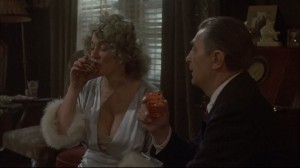 Farewell, My Lovely doesn’t have The Godfather’s weight or length, nor should it with Robert Mitchum’s Marlowe uttering dialogue like, “she had all A’s, but none of them from her report card,” and “cathouse got your tongue?” Mitchum was the perfect age for the part, too old to be convincingly charming, debonair, and devastatingly handsome (he was 58, 61 when The Big Sleep was remade), but with a past recent enough where the character might fool himself into thinking rich women would be throwing themselves at him left and right. That’s where Richards’ languorous pace, which might be called elegantly slow (at odds with everything producer Jerry Bruckheimer has made since), helps out. The third act of Farewell, My Lovely is often muddled, but Mitchum’s occasional lack of self-awareness, even when he’s telling his story in flashback, gets you in the mood, without letting the movie lapse into what it really is… An episode of Murder, She Wrote with a lot of dead bodies left in his wake and his sleep.
Farewell, My Lovely doesn’t have The Godfather’s weight or length, nor should it with Robert Mitchum’s Marlowe uttering dialogue like, “she had all A’s, but none of them from her report card,” and “cathouse got your tongue?” Mitchum was the perfect age for the part, too old to be convincingly charming, debonair, and devastatingly handsome (he was 58, 61 when The Big Sleep was remade), but with a past recent enough where the character might fool himself into thinking rich women would be throwing themselves at him left and right. That’s where Richards’ languorous pace, which might be called elegantly slow (at odds with everything producer Jerry Bruckheimer has made since), helps out. The third act of Farewell, My Lovely is often muddled, but Mitchum’s occasional lack of self-awareness, even when he’s telling his story in flashback, gets you in the mood, without letting the movie lapse into what it really is… An episode of Murder, She Wrote with a lot of dead bodies left in his wake and his sleep.
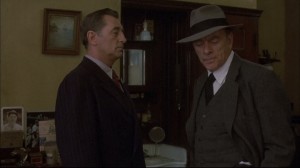 In fact, like the noir bible says, the only time Marlowe gets actual rest is when he’s knocked out by some unseen party, always waking up surrounded by a corpse or two. Mitchum gets conked on the head almost as many times as Ralph Meeker did when he played Mike Hammer in Kiss Me Deadly, a movie which will always hold the record for forced concussions per minute of screen time. Richards plays along with the noir rules as best as he can, Sylvia Miles plays another one of her soused cougars (she was Oscar nominated for practically the same role in Midnight Cowboy), former boxer Jack O’Halloran, a dead ringer for Richard Kiel, is the cartoonish lunk Moose Malloy, who hires Marlowe to find his girlfriend, and Harry Dean Stanton is the corrupt cop who is always ready to nastily banter with Marlowe (“And don’t steal the doorknobs!”). Richards does no winking throughout the film which helps us swallow the clichés we know well; his only major misstep is the casting of Charlotte Rampling as the femme fatale. Rampling is unconventionally beautiful, instead of classically beautiful, suggesting she might not have been appreciated in the 1940s (see Maggie Gyllenhaal in The Dark Knight). She switches between looking down on Marlowe and flirting with him, but she never convinces us that she’d sink to his level. She doesn’t have the malleable sleaze factor going for her; she could play a queen, but not a tramp.
In fact, like the noir bible says, the only time Marlowe gets actual rest is when he’s knocked out by some unseen party, always waking up surrounded by a corpse or two. Mitchum gets conked on the head almost as many times as Ralph Meeker did when he played Mike Hammer in Kiss Me Deadly, a movie which will always hold the record for forced concussions per minute of screen time. Richards plays along with the noir rules as best as he can, Sylvia Miles plays another one of her soused cougars (she was Oscar nominated for practically the same role in Midnight Cowboy), former boxer Jack O’Halloran, a dead ringer for Richard Kiel, is the cartoonish lunk Moose Malloy, who hires Marlowe to find his girlfriend, and Harry Dean Stanton is the corrupt cop who is always ready to nastily banter with Marlowe (“And don’t steal the doorknobs!”). Richards does no winking throughout the film which helps us swallow the clichés we know well; his only major misstep is the casting of Charlotte Rampling as the femme fatale. Rampling is unconventionally beautiful, instead of classically beautiful, suggesting she might not have been appreciated in the 1940s (see Maggie Gyllenhaal in The Dark Knight). She switches between looking down on Marlowe and flirting with him, but she never convinces us that she’d sink to his level. She doesn’t have the malleable sleaze factor going for her; she could play a queen, but not a tramp.
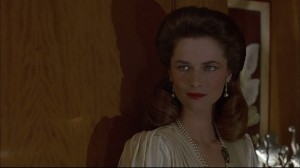 Rampling’s plot, with her manipulating her much older Judge husband (played by famed noir author Jim Thompson, who wrote The Grifters, The Getaway, and The Killer Inside Me) doesn’t criss-cross very well with Moose Malloy’s, even if it ends up making sense by the final scene. There’s far too much exposition (and “talking killer” scenes) required for the last twenty minutes of Farewell, My Lovely, that it might have been better to steer away from the novel, simplifying the film to just the search for Malloy’s girl, dropping the political conspiracies and drive-by attempts. The seediness of the early scenes where Malloy brings Marlowe to a “colored” bar is what really lends authenticity to the movie, and it’s a shame that the subsequent violence that occurs and the police’s nonchalant reaction to murders of non-whites is mostly dropped. Just because the point is that the simplistic Marlowe is always in over his head, doesn’t mean the movie has to be so convoluted.
Rampling’s plot, with her manipulating her much older Judge husband (played by famed noir author Jim Thompson, who wrote The Grifters, The Getaway, and The Killer Inside Me) doesn’t criss-cross very well with Moose Malloy’s, even if it ends up making sense by the final scene. There’s far too much exposition (and “talking killer” scenes) required for the last twenty minutes of Farewell, My Lovely, that it might have been better to steer away from the novel, simplifying the film to just the search for Malloy’s girl, dropping the political conspiracies and drive-by attempts. The seediness of the early scenes where Malloy brings Marlowe to a “colored” bar is what really lends authenticity to the movie, and it’s a shame that the subsequent violence that occurs and the police’s nonchalant reaction to murders of non-whites is mostly dropped. Just because the point is that the simplistic Marlowe is always in over his head, doesn’t mean the movie has to be so convoluted.



